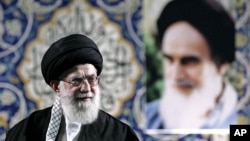Iranian Supreme Leader Ayatollah Ali Khamenei demanded international economic sanctions imposed against Tehran be lifted as soon as final agreement is reached on Iran's nuclear development program.
In a speech on Iranian television Thursday, the cleric stressed a framework agreement with the West is no guarantee a final deal will be reached to restrain Tehran's nuclear program in exchange for lifting the international sanctions.
Khamenei said he is "neither for nor against" the interim agreement reached last week by Iran and six world powers, insisting the deal is unfinished and non-binding.
“I neither support it nor oppose it because nothing has happened yet. ... The whole issue lies in the details that they are meant to discuss one by one,” Khamenei said.
But in making his first comments on the deal, Khamenei also demanded that all sanctions on Iran be lifted at the same time as any final agreement on curbing Tehran's nuclear program is concluded.
Sanctions timetable
His stand on the lifting of sanctions matched comments earlier Thursday by President Hassan Rouhani, who said Tehran would not accept any final deal unless all international sanctions are lifted.
Those measure include nuclear-related United Nations resolutions as well as U.S. and EU nuclear-related economic sanctions.
However, Iran's most powerful official did express his continued support for the negotiations and said he is open to a compromise deal that "respects Iran's dignity and honor."
Khamenei also slammed the United States for releasing a fact sheet following the talks that outlined Washington's interpretation of the agreement - a move he said reflected "devilish intentions."
Tehran and Washington have repeatedly disagreed over several key details, including the speed at which international sanctions against Iran would be lifted once a final deal is reached.
"We will not sign any agreement unless all economic sanctions are lifted at once, on the very first day of the implementation of the agreement," Rouhani said at a speech to mark Iran's "National Nuclear Technology Day."
Iran has repeatedly demanded the sanctions be removed immediately and permanently, while the United States prefers a more gradual phasing-out process to ensure Iranian compliance.
Addressing a press conference on his three-day trip to the Caribbean and Central America on Thursday, Obama reiterated his stance on the prospect of easing of sanctions.
"As I’ve said from the start, this is not done until it’s done," he told reporters in Kingston, Jamaica. "And the next two to three months in negotiations are going to be absolutely critical for making sure that we are memorializing an agreement that gives us confidence and gives the world confidence that Iran, in fact, is not pursuing a nuclear weapon. If that is the case, then Iran I think will benefit its economy being open to the global economy."
June deadline
Iran and the West have set a June 30 deadline to work out their disagreements, though Khamenei said Thursday it would not be "the end of the world" if that deadline were extended.
The outline was a major breakthrough in a 12-year international crisis over Iran's nuclear program and raised hopes among ordinary Iranians of a lifting of sanctions that have stifled the economy.
In comments that reflect another area of dispute, U.S. Secretary of State John Kerry late Wednesday told the PBS Newshour that Iran must disclose its past alleged military-related nuclear activities if a final deal is to be reached.
"They have to do it. It will be done. If there's going to be a deal, it will be done. It will be done," Kerry said.
The U.S. government and many of its allies believe Iran's nuclear program is aimed at producing a weapon, despite Iran's insistence that the program is for civilian energy purposes.
Iran so far has refused to offer an explanation for findings by the U.N. nuclear watchdog that suggest certain parts of Tehran's nuclear program have only military-related uses.
The U.S. and Iran have both released their own bullet-point interpretations of the framework agreement, since officials said they could not agree on a comprehensive document.
Neither the questions surrounding the military dimensions of Iran's nuclear program nor the sanctions relief issue were clearly spelled out in the U.S. document.
Some material for this report came from Reuters and AFP.





